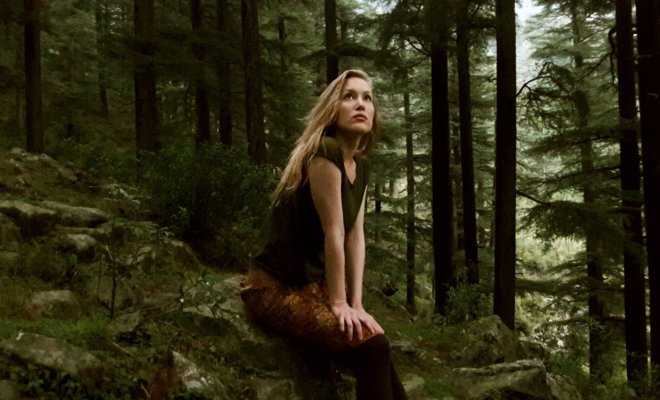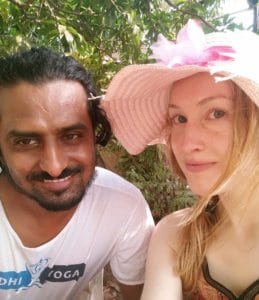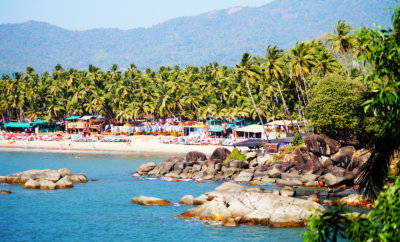Expat Voices
Expat Voice: A Precious Bond With India

Julie Vanacker
Julie Vanacker from Belgium feels living in India has made her more flexible, confident and more open towards people.
Julie Vanacker from Belgium moved to Goa for love in 2014. “My husband Chetan Baghel is Indian. We have known each other for nine years, but it’s only five years ago that we started to connect more with each other and really fell in love,” Julie tells Little India.
The couple run a teaching school called Rasovai that trains students from across the country and the world in “holistic” Ayurveda-based therapies, bodywork, meditation courses and yoga anatomy.
Vanacker talks about how she met her husband, her family’s links with the country and much more.
All for Love
Chetan, my husband, and I were connected to each other through Facebook while looking for some interesting courses during my first visit to India in 2009. I could not enroll into that particular course because other things came up.
However, we ended up becoming friends and kept in touch. About five years ago, we somehow found each other. It seemed like the timing was just right. We met when he came to Europe and have been together ever since.
Eventually, I decided to take the risk of moving to India. It has turned out to be a good decision. We have been married for three years now.
Similarities and Differences
The behavior and lifestyle of teenagers in both Belgium and India is quite different. In Belgium and Western Europe in general, teenagers can be quite moody, rebellious and often very much into sex. Whereas, many Indian teenagers that I have come across look much younger than their age. They are quite child-like and innocent and seem to be late-bloomers, compared to European teenagers. They are also happier and more at ease during this phase of life.
Family is important in both countries. However, in India, there is more interpersonal connectivity between people. Social life seems to be stronger. People easily make more time for each other.
In Belgium we have better infrastructure and higher living standards, but then there are first-world problems and people are not necessarily happy or content.
Old Connections With India
I have had a connection with India since a very young age. For many years, most of my family, on my mother’s side, were financially supporting Indian Christian priests to build schools and hospitals in Indian villages. Several of those priests would visit my family in Belgium and stay with us for some time almost every year. They always brought beautiful, exotic gifts for us.
My mother and aunt introduced me to yoga and meditation at a very young age. My experiences in the field continue to influence and shape the course of my life even today. When I was 15 years old, I started to read the philosophies of Indian teachers like U.G Krishnamurti and Osho–another influence that drew me to India.
Life in Goa
I began playing the piano again after 7-8 years of no real practice. I take weekly lessons from a multi-instrumentalist, who is internationally trained.
I also love that we are always so close to the beaches and that you can go on long drives around here. The flora and fauna in India completely steal your heart. I have had many beautiful encounters with all sorts of animals here.
However, there is no proper garbage disposal system in place here. Recycling seems to be a very foreign concept. Most of the local people simply gather their plastic, tin foil, sanitary pads, soda cans–really anything–and burn it all together in any random place. It’s sickening!
My husband and I have tried to work together with many of our neighbors to find solutions and make some practical changes. While some of them were very enthusiastic, with many others it just fell on deaf ears, therefore, nothing really changed.

Julie Vanacker with her husband Chetan Baghel
A Tragic Incident
Several years ago, two young people drowned in front of my eyes in the rough parts of the river Ganges in Rishikesh while I was celebrating my birthday with a few friends.
We were celebrating on a secluded patch next to the river when a group of youngsters suddenly began to cry for help. Two of their friends, a young man of about my age and a girl, younger than them, had accidentally slipped from a rock into the river just when there was a strong current.
People could only retrieve the body of the young man from the river. They carried his lifeless body and put it right in front of our feet. The girl was found days later.
This was the first time that I witnessed an incident that I witnessed death that was so tragic and sudden. I have witnessed several accidents and deaths since then, but this one has had the most impact on me. It maybe because it happened on my birthday–the one day when you are reminded of how immensely precious your existence on this planet is.
The incident became a profound reminder of my mortality. Those people were having fun, but in a matter of seconds they were gone. It made me realize that I should not take my life for granted.
Different Experiences
I have seen, on many occasions, Indian parents adorn their baby boy with feminine bracelets, earrings, kajal, a tika on the forehead and so on. This made me assume that these baby boys were actually girls, probably much to the annoyance of the parents.
Also, when family or wedding pictures are taken, people often seem to keep serious and emotionless faces. It reminds me of the photographs taken of people in Europe and Victorian England in the 19 th century– it’s a bit funny.
A Surreal Thought
I stayed in Delhi for a night to catch a flight the next morning. Around 7 am, a taxi driver took me to the airport–a drive of about 25 minutes. I saw the weirdest thing ever in those 25 minutes–there were only men on the streets. So many men in their cars, riding bicycles or walking, but no women at all–maybe three women in total. But they just faded away in a sea of hundreds of men.
It looked totally surreal and a bit frightening. I have never before or since seen something like that in India or in the world.
Bursting the Bubble
Living here has made me more resilient, flexible and confident, and more open and understanding towards people. Before I moved to Goa, I was quite shy, but my lifestyle here has burst that bubble and helped me connect with different kinds of people easily.
My stay here has also made me very skeptical with the international and mainstream media because a lot of what is written or shown about India, including political and social events, is often biased.
Life in India is always intense, dynamic, and hardly boring. You just have to step out of your house every day to witness a new and different kind of event.
The interview has been condensed and edited.
Expat Voice is regular column on expats in India. Email us at expat@littleindia.com to nominate yourself or another expat for the column.




You must be logged in to post a comment Login